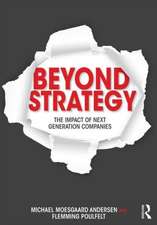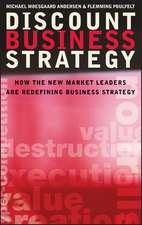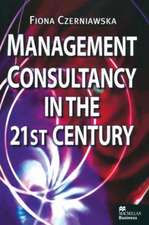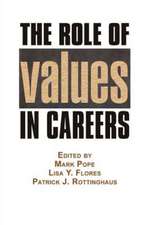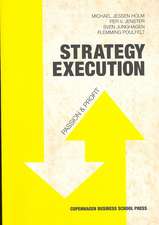Managing the Knowledge-Intensive Firm
Autor Nicolaj Ejler, Flemming Poulfelt, Fiona Czerniawskaen Limba Engleză Hardback – 9 aug 2011
This book examines what sets knowledge-intensive firms apart from other types of organizations, and the resultant organizational and strategic differences in business models, talent management, and client-handling approaches. The authors bring their own complementary perspectives on the subject: one, as the manager of a private consulting firm with a strong research background; another, as a business school professor whose practice-based skills are fundamental to his work; and a third, a world leading commentator on professional service firms acting as a consultant, business school researcher and a manager.
Ejler, Poulfelt and Czerniawska present a new model for transforming the management of knowledge-intensive firms, which is supported throughout with practical examples and cases.
| Toate formatele și edițiile | Preț | Express |
|---|---|---|
| Paperback (1) | 334.55 lei 6-8 săpt. | |
| Taylor & Francis – 9 aug 2011 | 334.55 lei 6-8 săpt. | |
| Hardback (1) | 766.12 lei 6-8 săpt. | |
| Taylor & Francis – 9 aug 2011 | 766.12 lei 6-8 săpt. |
Preț: 766.12 lei
Preț vechi: 1028.54 lei
-26% Nou
Puncte Express: 1149
Preț estimativ în valută:
146.62€ • 151.46$ • 122.02£
146.62€ • 151.46$ • 122.02£
Carte tipărită la comandă
Livrare economică 26 martie-09 aprilie
Preluare comenzi: 021 569.72.76
Specificații
ISBN-13: 9780415678018
ISBN-10: 0415678013
Pagini: 212
Ilustrații: 34 b/w images, 10 tables and 24 line drawings
Dimensiuni: 138 x 216 mm
Greutate: 0.56 kg
Ediția:1
Editura: Taylor & Francis
Colecția Routledge
Locul publicării:Oxford, United Kingdom
ISBN-10: 0415678013
Pagini: 212
Ilustrații: 34 b/w images, 10 tables and 24 line drawings
Dimensiuni: 138 x 216 mm
Greutate: 0.56 kg
Ediția:1
Editura: Taylor & Francis
Colecția Routledge
Locul publicării:Oxford, United Kingdom
Public țintă
PostgraduateCuprins
Introduction 1. Value Creation in Knowledge-Intensive Firms 2. What Do Clients Buy? 3. The Inner Workings of Knowledge-Intensive Firms 4. Consistent Strategy and the Client 5. Employee Capital 6. Shaping Behaviour: Values and Cultural Modelling 7. Relations with Clients Rules Strategy Execution 8. Holistic Management: The Pyramid at Play 9. Epilogue
Recenzii
'Provides a useful summary in the area of knowledge-intensive firms. It applies the theory to practice for researchers'
Sajjad M. Jasimuddin, Aberystwyth University, UK
'Knowledge-intensive businesses represent perhaps the most attractive segment for many companies from the developed world to focus on. This book makes a significant contribution to how to make knowledge-intensive firms successful. Above all, the focus on innovations and entrepreneurship in such firms is key. This book represents a must read to all leaders who are taking their final steps from product-focus to knowledge-intensity.'
Peter Lorange, President, Lorange Institute of Business Zurich
'This book is an important book for those involved in the leadership of knowledge-intensive firms. It provides new insights about such leaders, while building constructively on earlier books about such firms.'
Jay W. Lorsch, Harvard Business School, USA
'In a strong and systematic way the authors present a refreshing approach to the challenges and conditions for managing knowledge-intensive organizations based on highly skilled professionals. They have clear suggestions for a new paradigm for managing these organizations whether private, public or third sector.'
Claes Nilas, Permanent Secretary, Danish Ministry of Refugee, Integration and Immigration Affairs
'Managing knowledge-intensive firms fills an important gap since it concentrates on an important theme that is still relatively neglected – how to run a firm successfully. Everyone with leadership responsibility in our sector will find useful lessons here.'
Alan Leaman, Chief Executive, Management Consultancies Association
Sajjad M. Jasimuddin, Aberystwyth University, UK
'Knowledge-intensive businesses represent perhaps the most attractive segment for many companies from the developed world to focus on. This book makes a significant contribution to how to make knowledge-intensive firms successful. Above all, the focus on innovations and entrepreneurship in such firms is key. This book represents a must read to all leaders who are taking their final steps from product-focus to knowledge-intensity.'
Peter Lorange, President, Lorange Institute of Business Zurich
'This book is an important book for those involved in the leadership of knowledge-intensive firms. It provides new insights about such leaders, while building constructively on earlier books about such firms.'
Jay W. Lorsch, Harvard Business School, USA
'In a strong and systematic way the authors present a refreshing approach to the challenges and conditions for managing knowledge-intensive organizations based on highly skilled professionals. They have clear suggestions for a new paradigm for managing these organizations whether private, public or third sector.'
Claes Nilas, Permanent Secretary, Danish Ministry of Refugee, Integration and Immigration Affairs
'Managing knowledge-intensive firms fills an important gap since it concentrates on an important theme that is still relatively neglected – how to run a firm successfully. Everyone with leadership responsibility in our sector will find useful lessons here.'
Alan Leaman, Chief Executive, Management Consultancies Association
Descriere
Over the last decade, there has been a substantial rise in the number of knowledge-intensive firms. The core assets of these businesses are the people themselves and so, successful managers of knowledge-intensive firms must inspire their employees and target their individual ambitions, to ensure high performance.
This book examines what sets knowledge-intensive firms apart from other types of organizations, and the resultant organizational and strategic differences in business models, talent management, and client-handling approaches. A new model for transforming the management of knowledge-intensive firms is presented, which is supported throughout with practical examples and cases.
This book examines what sets knowledge-intensive firms apart from other types of organizations, and the resultant organizational and strategic differences in business models, talent management, and client-handling approaches. A new model for transforming the management of knowledge-intensive firms is presented, which is supported throughout with practical examples and cases.


